Hair loss is particularly prevalent in our modern society. People are nutrient deficient due to the standard american diet, many are dealing with gut health issues, and others have hormonal imbalances. There are several different types of hair loss, but the majority of hair loss cases have a similar root cause and a similar approach to addressing it. I get a lot of questions about hair loss from people, so I’m addressing the most frequently asked questions below. No matter the type of hair loss you’re experiencing, read on for more information on how you can start to address it.
Why does hair loss happen out of nowhere?
Hair loss is always coming from somewhere and it’s due to an imbalance in your system. The imbalance is always connected to inflammation (unless you’re pulling it out yourself!), which wreaks havoc on your body. So, the key to reversing hair loss is to figure out where the inflammation is coming from, why you’re experiencing it, and determine how to reverse it.
My story: I was eating a diet that wasn’t working for me. At the time, I was a vegan with very little thoughts about food other than it not making a big impact on the environment or animals. My diet was high in caffeine, carbs, processed food, and alcohol, with very little focus on protein or quality. When I switched to an unprocessed paleo diet after 10 years of being meat-free, I began noticing reversal of my alopecia areata spots within six weeks.
Are standard hair loss treatments effective?
Standard hair loss treatments typically involve topical remedies like steroid injections, shampoos, and creams that are supposed to stimulate hair growth. Occasionally these will work temporarily, but it has been my experience with myself and my clients that this method is ineffective long-term, if at all.
That’s because standard hair loss treatments are not designed to get to the root of what caused your hair loss to begin with. The root of all disease, and hair loss, is inflammation, so it’s important to determine where that inflammation is coming from. If you’re just masking the symptoms that make you uncomfortable with a fancy shampoo, you’re not addressing a potentially life threatening problem that will manifest in other ways if ignored.
Don’t let that terrify you, though! I hear from women all the time who are experiencing hair loss and just haven’t known what avenues to take in order to get to a root cause.
Here are a few questions to ask yourself if you don’t know where to start:
- Am I eating a well balanced diet with adequate amounts of healthy fats, carbs, and protein?
- Are most of my meals made out of fresh meat, veggies, and properly prepared grains and legumes?
- Have I done an elimination diet to determine potential food sensitivities?
- Am I getting adequate amounts of vitamins and minerals through my diet, and digesting them properly?
- Am I having daily bowel movements that are solid, one inch in diameter and I don’t have to strain to expel them?
- Do I get 8-10 hours of sleep each night?
- Do I have adequate amounts of energy to get through the day?
If you answered “no” to any of these questions, it’s likely you’re dealing with some inflammation that could be contributing to your hair loss. You can easily address the above issues on your own or by working with a nutritionist. Note: if you are postpartum, hair loss is normal and will grow back.
My story: When I first realized I had alopecia areata, I went on an elimination diet to remove all potentially inflammatory foods, and then reintroduced them one at a time. What I discovered is that I’m highly sensitive to corn, soy, grains, and legumes. Removing these items from my diet, in addition to focusing on sleep and stress management, reduced my body’s inflammatory response. My hair began to grow back approximately 6 weeks after starting the protocol.
Unfortunately, in 2017, I moved into a new home and my hair started falling out again. This time, instead of random bald patches around my head, I was experiencing male pattern balding. I worked with my doctor for three years to find a root cause (we tried to tackle non-budging estrogen dominance and candida), but my hair loss never subsided, even when I was feeling pretty good.
That’s because I hadn’t gotten to the root cause.
Which holistic hair loss treatments work?
I would caution anyone on using a topical remedy to solve an internal issue like hair loss. It’s a bandaid approach to healing and bandaids fall off.
The #1 best thing you can do to start healing your hair loss is create a strong food foundation. Meaning, you’re eating an anti-inflammatory diet most of the time. If you’re not sure where to start with diet, I recommend you begin by cutting out foods that people are commonly sensitive to like soy, dairy, gluten, corn and eggs, then avoiding highly inflammatory foods like processed sugar and refined vegetable oils. This meal plan is free of all those things!
If you’ve already got the food part down, keep reading.
- Do a proper elimination diet (like AIP or Whole 30) to see if you’re experiencing any food sensitivities that are leading to inflammation.
- Make sure you have enough vitamin D and iron as deficiencies in either are known to cause hair loss.
- Have your estrogen, progesterone and testosterone levels tested to see if they are out of balance. Too much or too little of these sex hormones can lead to hair loss.
- Get a full thyroid panel done. Low thyroid is one of the most prominent causes of hair loss in women.
- Test for environmental toxins like mycotoxins and heavy metals, then detox if needed. Toxins can cause a myriad of issues in the body which can lead to hair loss.
- Look for other co-infections like SIBO, candida, lyme disease, h-pylori, and parasites.
[convertkit form=1982126]
How much hair loss is normal?
This really varies on a case to case basis because of bio-individuality. That means that no one person’s body is alike, and we will all lose hair in various amounts. If you feel like your hair loss has increased recently or you’re noticing thinning, it’s not in your head (yes, punny..).
Many people experiencing hair loss will be dismissed by those around them. You know your body best and if your spidey-senses are telling you you’re losing too much, then you’re right. Find a functional doctor or nutritionist who can help you explore what’s going on.
I’ve improved my diet and take supplements, why isn’t my hair loss subsiding?
If you hair loss hasn’t subsided then you haven’t gotten to the root of your inflammation and imbalances! It can be really frustrating when you’re doing all the things and still don’t notice a difference. There is ALWAYS a reason for your symptoms, though. Keep peeling back the layers.
My story: After drastically changing my diet and treating gut dysbiosis I was still losing my hair in male pattern balding. The functional nurse practitioner I had been working with for four years eventually said “it just takes time for your body to rebalance,” but my spidey senses told me she was wrong. I had access to my own expensive testing as an NTP that she didn’t feel comfortable running, so I decided to bite the bullet, spend the money, and peel back the layers of hair loss myself. It turned out I was spot on. Not only was I struggling with heavy metal toxicity, I was also dealing with mold illness. After doing a thorough detox, my body was able to rebalance and my hair began growing back again!
How long should it take to experience regrowth?
In both my personal and professional experience, if you’re on the right track you should begin noticing hair regrowth in at least 6-12 weeks. In some cases, scarring will occur, which makes it impossible for hair to grow back. It’s important to address root causes sooner, rather than later, to prevent this from happening.
If you’re feeling overwhelmed and want to take a partner on this, I’m currently accepting 1:1 clients. You can apply to work with me here.
If you liked this blog post, you may also like:
How to have a social life with no energy
What to do if you think you have toxic mold
Have you experienced hair loss? Let me know in the comments of this blog post. I’m curious to know if you had one of the root causes listed or if you experienced it for any other reason!
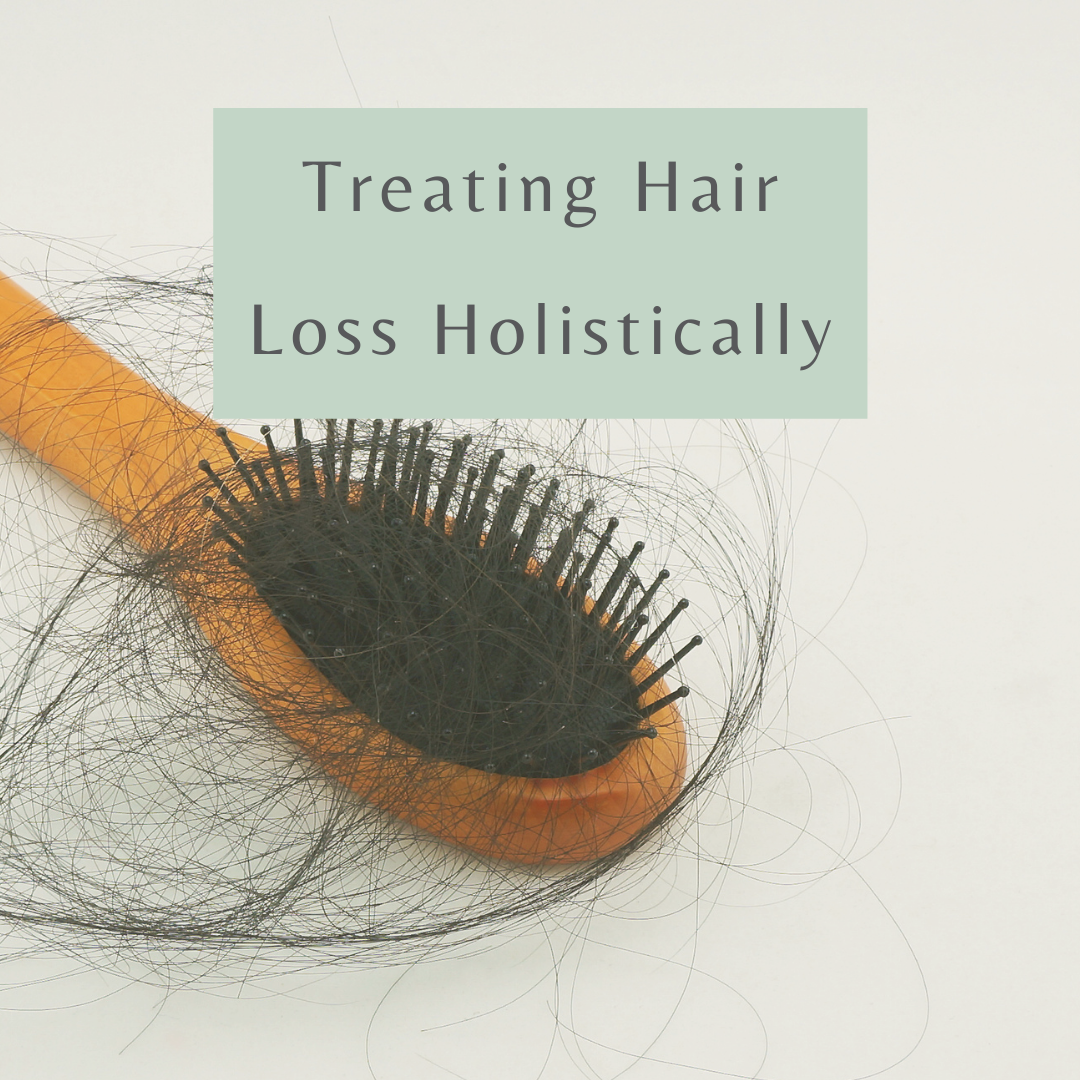
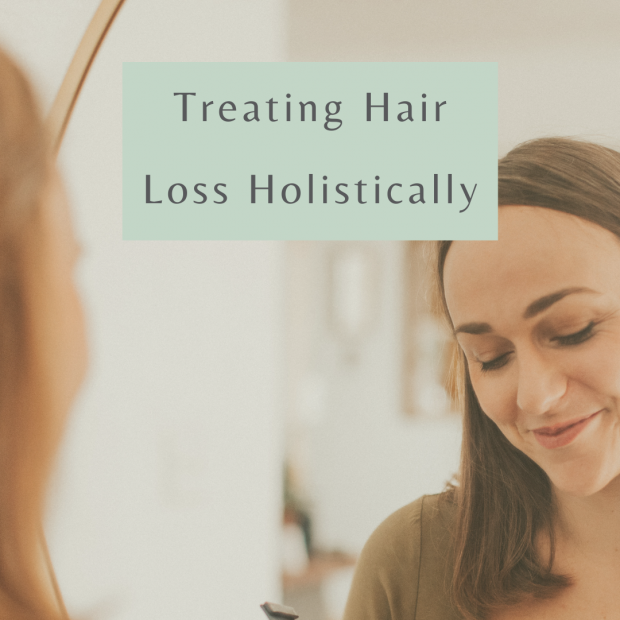
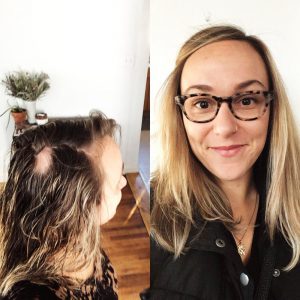
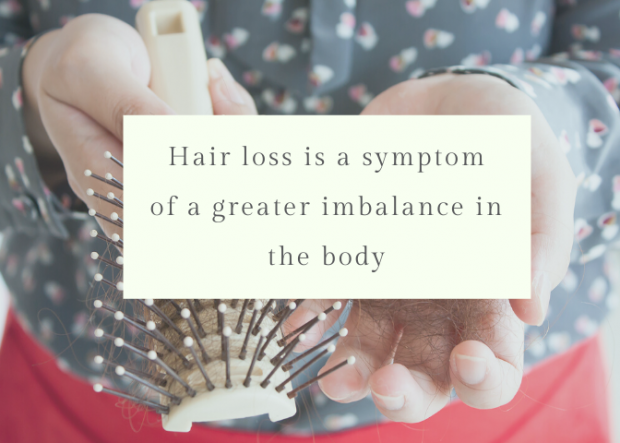
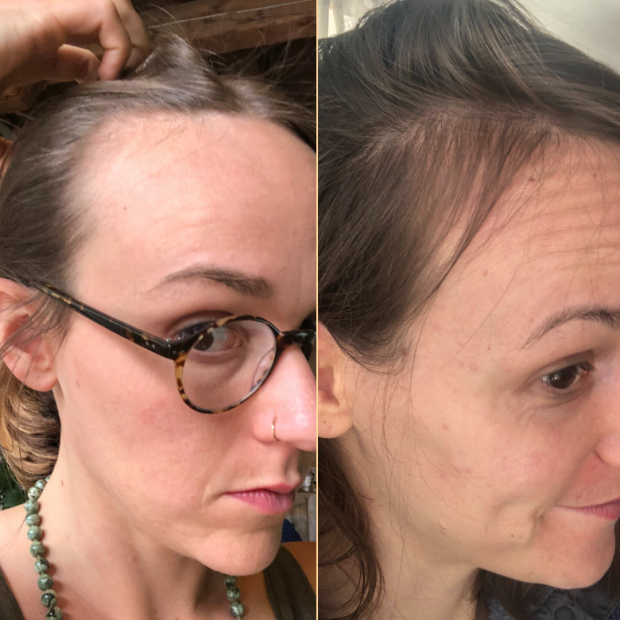
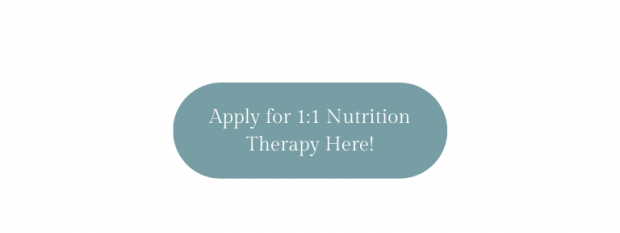
I truly appreciate this post. I’ve been looking all over for this! Thank goodness I found it on Bing. You’ve made my day! Thx again!
Yay! I’m so glad. I know it can be lonely out there. Wishing you the best!
Hello. I recently developed Alopecia Areata . I currently have one patch on the left top of my head and experiencing a ton of shedding everywhere else . I believe my dental implant (titanium) , which was inserted 5 months ago, could be the trigger .
stress on the body can absolutely be a contributing factor. So can heavy antibiotic use or any other toxins that were used during surgery (I do not tolerate any form of injections and get very sick from numbing!).
I have been severely struggling with numerous AI responses with only a few diagnosis so far – celiac, psoriasis and psoriatic arthritis. I’ve also started having connective tissue issues and whole body pain to go with all my other ailments such as almost debilitating fatigue and migraines. I did AIP two years ago for about 6 months and had significant improvement though the joint pain and fatigue persisted. I’ve recently been made aware of BII (had mine done in 2007, one year before I started having pain and getting food intolerances) and wonder if there is a way I can detox some of the heavy metals I know are poisoning me until I can afford explant. I know I can’t get better until they are removed but thought maybe you had insight to how I can lesson the severity with a detox? Thank you for any help!
Hey Hope! Sorry for the delay in responding. There are some gentle detox things you can do to support yourself until you are ready to invest in a care partner. I really like dry brushing, getting in the sauna, drinking milk thistle and dandelion tea (search coffee on my website for a great detox coffee recipe), and exercise/rebounding if you are physically able. Check out my amazon shop for my favorite detox tools https://www.amazon.com/shop/rooted.in.healing
Loved this blog! I tried shampoos, supplements, nothing was working. Stress was a big factor in my hair loss in addition to the inflammation. I did NOT want to give up certain things as they were comforting during my stressful times, but when I decided to change my diet (in addition to getting more control over my stress) I saw a change. For me, I first noticed the hair stopped falling out, then about 2 months later I noticed it growing back. It takes a bit of time, but it’s amazing how when we treat our bodies good, they respond! 🙂
I’m on Azathioprine for my autoimmune hepatitis. I thought I had escaped the hair loss side effect, but 9 months into taking the med, but hair has begun to thin. Oddly enough, I was also one week into the AIP elimination phase, which ends this week. I’m not sure if there is anything I can do. Any suggestions?
Have you been able to try managing your disease through diet and lifestyle without taking the medication? Definitely worth talking to your doctor about.
My 13 year old daughter developed alopecia areata last October a week after her grandpa passing. I guess the stress triggered it. We have changed her diet and seen a lot of improvement . She is working with a FM doc and has started taking supplements. The only thing now is she has very flaky scalp, maybe seborric dermatitis . Any tips on that?! If any of the flakes are scraped off there is usually hair attached to them.
It’s hard to say without knowing her health history and specific diet/case. Could b several things!
Hi Maegen
We are going through the exact same experience. My daughter is 13, lost her grandparents a year ago, and started losing her hair soon after. We’ve also recently started working with an FM doctor. Please let me know if you’d like to get in touch, maybe we can help each other along.
Mags
My 5 year old daughter started with small patches of hair loss from alopecia and now the whole top of her hair has gone, ive tried doctors recommendations of creams and it’s not working and they didn’t want to do any further checks into her health. After reading im going to try and change her diet and get to the root of the problem. She’s a fussy eater and the only foods she loves are carbs (bread, pasta, potatoes). Im hoping following your steps i can find out if this is the reason its not getting better. So thank you for giving me more hope that there is something I can try still.
There is always hope!! Let me know how it goes.
This is such a great post, I just got back from the derm with an AA diagnosis and knew topical steroids weren’t the answer. I have Hashimotos and eczema (generally autoimmunity prone) – this is my first experience with AA at 31. I’m following the AIP diet, filtering my water, minding my stress and focusing on detox (sauna, herbs, etc). I have a question- I took 3 Vyvanse pills (prescribed) for ADHD and it was right around then that my hair started shedding. I believe with my delicate constitution that overwhelming my body with amphetamines may have triggered the AA. I immediately stopped – do you think a stimulant med could have triggered an AA flare due to the physiological stress on the body? It’d be so great to be able to pinpoint something as the triggering event.. Thanks!
Hello,
I have androgenic alopecia. Will this as well help me?
Wow! I’ve experienced hair loss on and off for the last two years. It first started after a major stressful event followed by a move. It would then get better or worse depending on the season. Now that you’ve shared your story about mild illness, my brain is running in circles connecting the dots. Wow wow wow!
I went on AIP about 3 years ago. Prior to that I was eating very little meat. I experienced a relief of overall body pain and was taking supplements as prescribed from my functional doctor. However, I started losing large amounts of hair and this has continued. My family doctor told me I should not be eating so much meat and it was causing gout so I started back to vegetarian. I began to feel worse and am now trying to go back to the AIP. I am exhausted trying to get to the root of all my problems, body, muscle, joint pains, being tired, puffy face, brain fog, migraines, nerve pain, osteoporosis and now hair loss! The gynecologist wanted me to take a shot for osteoporosis as well as estrogen replacement which I have not done either of those, neurologist said nothing wrong with my nervous system, family doctor said to stop getting so many tests. I have been tested for lyme disease which I have suspected for many years and results are negative. I just want to know what to do!
I noticed a bald spot on the right side of my scalp about 6 months ago. It was about the size of a dime but it’s been getting bigger and bigger.
I saw a dermatologist and she explained what the cause could be and asked if I’m under a lot of stress.
I told her YES, I have two kids, my own business and I had left my boyfriend of 13 years pretty recently, and on TOP OF THAT, I had brain surgery in February to remove a tumor from my pituitary gland. So I’ve been recovering from that +my regular life.
She did the injections for me and explains it will help ease the inflammation so the hair will be able to grow.
Just today, I noticed two more spots on the left side, one on the top of my head and one kind of hidden by the crown.
I had this same issue 8 years ago but the shots helped instantly.
This time it seems like it’s getting so much worse.
After surgery I notice I don’t really eat, and the only thing I ingest is an iced coffee with SOY MILK!
So I’m really happy I stumbled upon this blog. I’m going to go grocery shopping tomorrow and start taking better care of my body. Thank you!
I recently was diagnosed w/ Lichen PLanaris. My dr says it is not curable but I’ve been doing a lot of reading & started AIP protocol diet yesterday to try & help. I read a book where a lady cured herself of it by doing AIP. I explanted 2 years ago but suspect my implants gave me this disease. GRRR! How do I find out if my body is holding mold? I did a metals test before & it was within normal range & I switched to Native deodorant.
Hi Kate — implant toxicity is very common, unfortunately. I’m so sorry you’re going through that. Have you had an explant yet? In order to test for mold I like to use Great Plains mycotoxin urinalysis or a balanced health full scan. It’s great that you have switched to cleaner products but more than anything we want to remove you from the source of toxicity and start to detox.